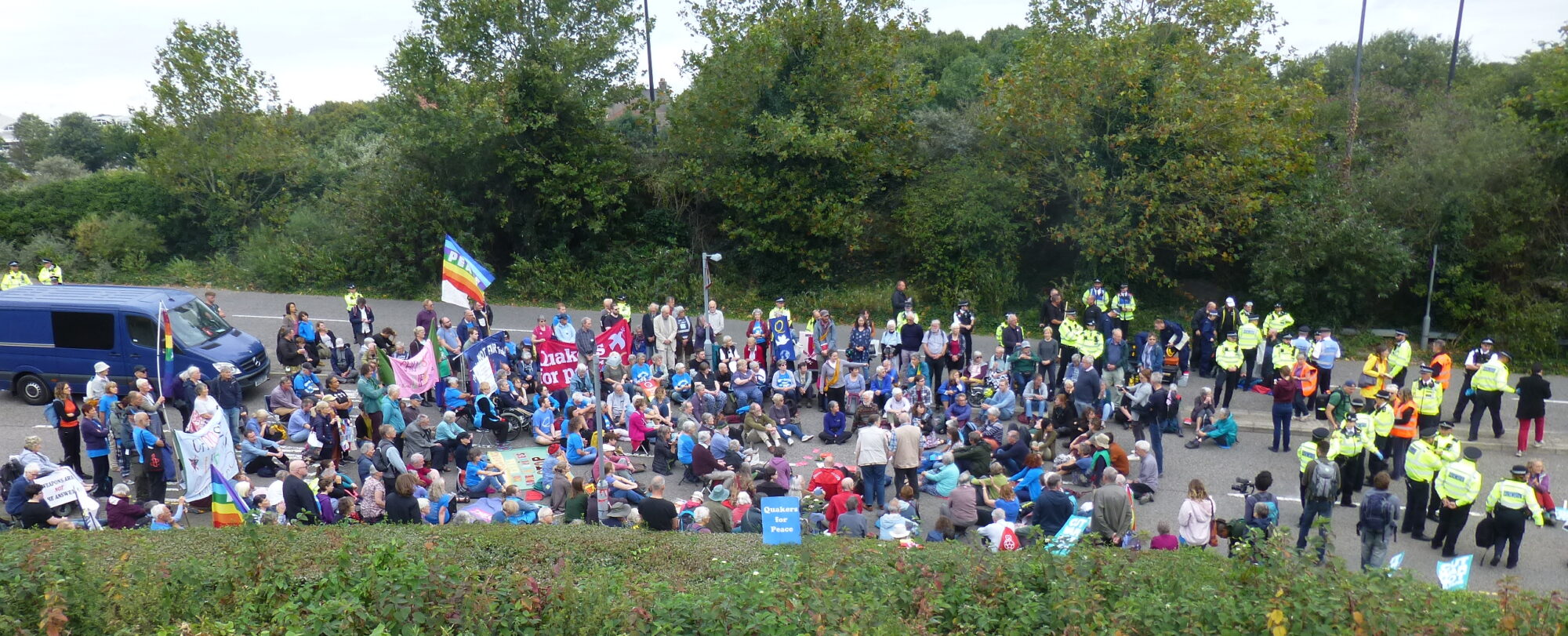Dear Friends,
Thank you so much for all that you’ve done since we’ve been at DSEI. Whether you joined the witness in person, or upheld us from afar, it has been wonderful to be with you in shining a light on the darkness of the arms trade, and building peace together as a community.
We will take time to reflect on our witness, and what we are called to do for peace, in the coming weeks and months. In the meantime, here are a few follow-up points:
Post DSEI Debriefs – online on Tues 26th Sept – details below. We’re sorry that due to rail strikes the in-person debrief has been postponed.
Please share your thoughts – see requests for your feedback below.
For those in London the Art the Arms Fair exhibition continues at Gallery 46 in Whitechapel until Sunday. There are also some final protest events happening today (Weds 13th Sept).
Peace Pilgrimage Podcast – you can listen to all the episodes at your leisure.
Media Coverage – Quakers got a mention in the Guardian’s coverage of the arms fair, as well as several independent and faith outlets. There was also an excellent letter written by Quakers to their local paper the Crediton Courier. Why not write about your experiences to local media?
While we take great heart from witnessing together, if you find yourself tired, glum or raging after the exertion and emotions of the last few days, these are perfectly reasonable responses. Remember to nourish and comfort yourselves, and check-in with those you travelled or buddied with.
Rest well and let’s look forward to a world of love, peace and justice, where no one is illegal – and a world free of arms fairs!
In peace,
The Quaker Roots organising team
Debriefs
We will hold two debrief sessions, one online and one in-person. These will be an opportunity to;
- Reflect on our witness;
- Share your thoughts on what went well and what we could learn from in future;
- Consider our leadings, individually and as Quaker Roots
Online Debrief – Tues 26th September 7pm
Register to receive the Zoom details (if you are not already on our mailing list).
POSTPONED: In-person Debrief
Dear Friends, we’ve heard there is a rail strike taking place this Saturday which means that none of the core group or QPSW staff would be able to get to London. In the light of this we have reluctantly taken the decision to postpone the planned Debrief at Friends House London due this Saturday 30th.
We hope you understand and we apologise for any inconvenience this might cause.
Before taking a decision on re-booking Friends House, we have a couple of questions for you…
- Would you still like an in-person debrief at Friends House?
- Would you prefer a further online session on another day?
Share your thoughts
At Quaker Roots we would love to hear your reflections on our witness – thank you to those who have sent reflections already already – hello@quaker-roots.org.uk
QPSW would like also your thoughts on how Quakers in Britain supported us – FaithInAction@quaker.org.uk with any thoughts on the following questions:
- what QPSW/Quakers in Britain support worked well for you?
- what QPSW/Quakers in Britain support could be improved?
- what QPSW/Quakers in Britain support was missing?
Our Friends at NetPol would like to hear about people’s experiences interacting with the police – NetpolAsmin@protonmail.com
Final Events at DSEI
Our friends at Art the Arms Fair and Demilitarise Education are continuing their exhibition We Ain’t dED Yet at Gallery 46, 46 Ashfield Street, Whitechapel, London, E1 2AJ 12-6pm each day until Sunday (17th Sept). This was recommended by a Friend on the way home from the vigil!
If you’re reading this on Wednesday there are also several events still happening today – see the Stop the Arms Fair website for more information.
Peace Pilgrimage Podcast
Thank you for upholding those of us undertaking a peace pilgrimage from Oxford to DSEI. Our experiences were captured in a podcast, alongside interviews with people we encountered on the way. Discussions on the themes of peace include personal experiences of living in conflict zones, the links between peace and climate, offering sanctuary for refugees, and the work of organisations such as the PPU and Rethinking Security. You can listen to all the episodes at your leisure.
Media Coverage
- The Guardian: Record numbers expected as Europe’s biggest arms fair opens in London
- Independent Catholic News: Quakers arrested during silent prayers outside world’s largest arms fair
- A letter written by Quakers to their local paper the Crediton Courier
- The Morning Star: Peace campaigners have the power to stop arms deals
- The Canary: Cops are already arresting activists at the DSEI arms fair
- Freedom News: Nine campaigners arrested at London arms fair

